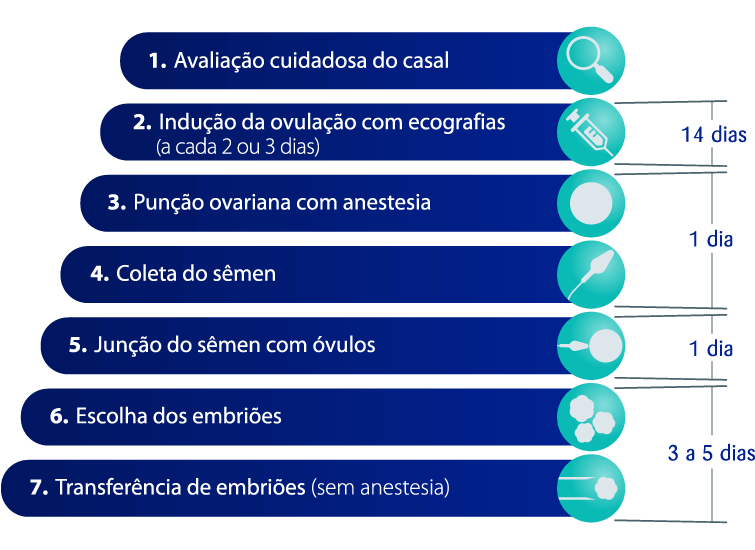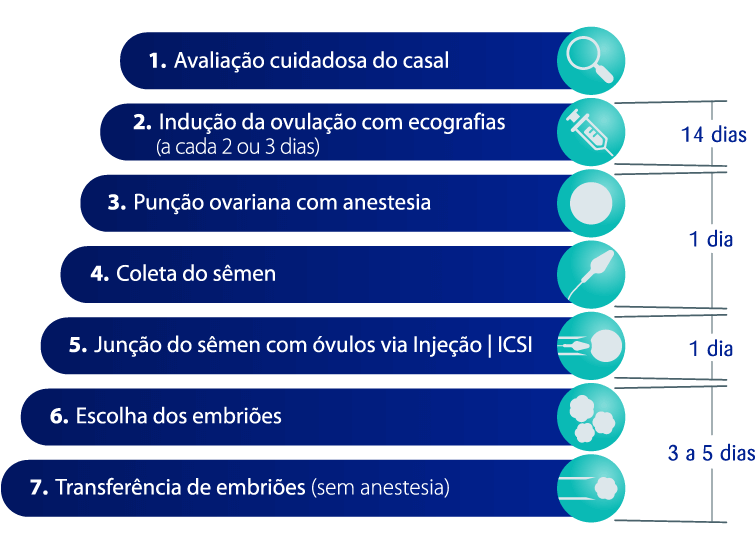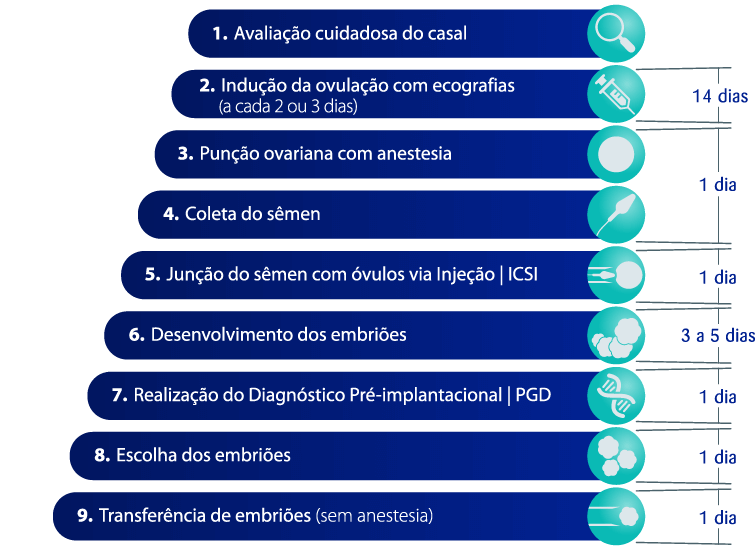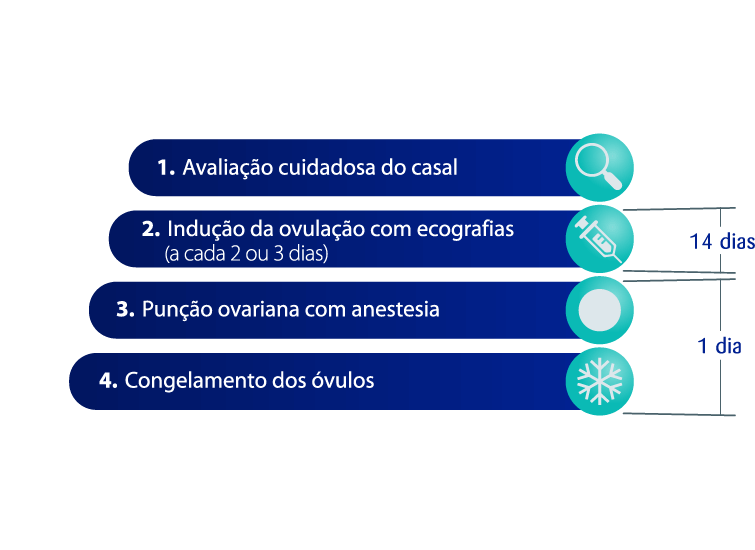Artigo Publicado - JBRA Assisted Reproduction
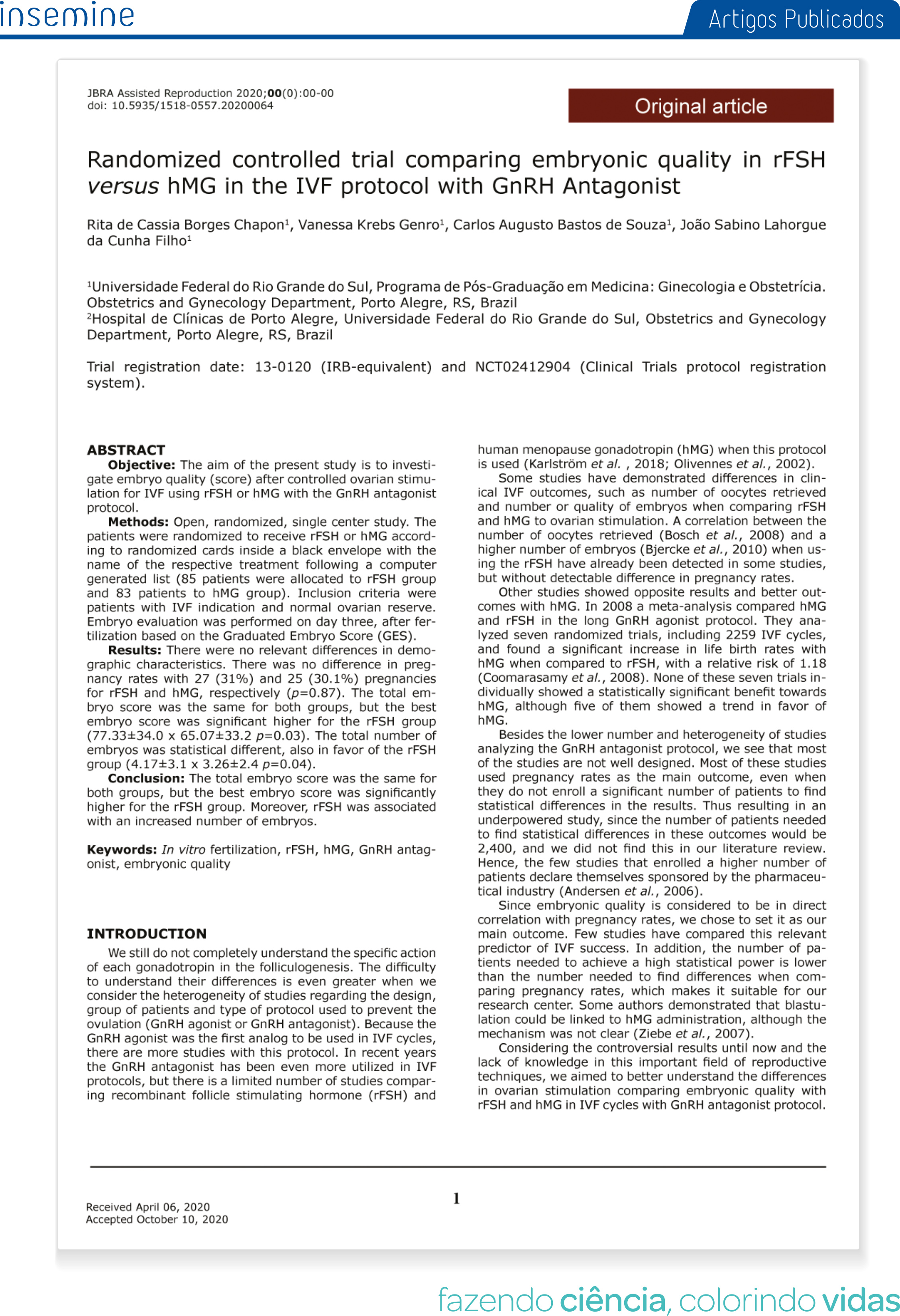
| 18 de Outubro de 2020
Ensaio controlado randomizado comparando a qualidade embrionária em rFSH versus hMG no protocolo de FIV com Antagonista de GnRH
ABSTRACT
Objective: The aim of the present study is to investi-
gate embryo quality (score) after controlled ovarian stimu- lation for IVF using rFSH or hMG with the GnRH antagonist protocol.
Methods: Open, randomized, single center study. The patients were randomized to receive rFSH or hMG accord- ing to randomized cards inside a black envelope with the name of the respective treatment following a computer generated list (85 patients were allocated to rFSH group and 83 patients to hMG group). Inclusion criteria were patients with IVF indication and normal ovarian reserve. Embryo evaluation was performed on day three, after fer- tilization based on the Graduated Embryo Score (GES).
Results: There were no relevant differences in demo- graphic characteristics. There was no difference in preg- nancy rates with 27 (31%) and 25 (30.1%) pregnancies for rFSH and hMG, respectively (p=0.87). The total em- bryo score was the same for both groups, but the best embryo score was significant higher for the rFSH group (77.33±34.0 x 65.07±33.2 p=0.03). The total number of embryos was statistical different, also in favor of the rFSH group (4.17±3.1 x 3.26±2.4 p=0.04).
Conclusion: The total embryo score was the same for both groups, but the best embryo score was significantly higher for the rFSH group. Moreover, rFSH was associated with an increased number of embryos.
Keywords: In vitro fertilization, rFSH, hMG, GnRH antag- onist, embryonic quality
INTRODUCTION
We still do not completely understand the specific action of each gonadotropin in the folliculogenesis. The difficulty to understand their differences is even greater when we consider the heterogeneity of studies regarding the design, group of patients and type of protocol used to prevent the ovulation (GnRH agonist or GnRH antagonist). Because the GnRH agonist was the first analog to be used in IVF cycles, there are more studies with this protocol. In recent years the GnRH antagonist has been even more utilized in IVF protocols, but there is a limited number of studies compar- ing recombinant follicle stimulating hormone (rFSH) and
human menopause gonadotropin (hMG) when this protocol is used (Karlström et al. , 2018; Olivennes et al., 2002).
Some studies have demonstrated differences in clin- ical IVF outcomes, such as number of oocytes retrieved and number or quality of embryos when comparing rFSH and hMG to ovarian stimulation. A correlation between the number of oocytes retrieved (Bosch et al., 2008) and a higher number of embryos (Bjercke et al., 2010) when us- ing the rFSH have already been detected in some studies, but without detectable difference in pregnancy rates.
Other studies showed opposite results and better out- comes with hMG. In 2008 a meta-analysis compared hMG and rFSH in the long GnRH agonist protocol. They ana- lyzed seven randomized trials, including 2259 IVF cycles, and found a significant increase in life birth rates with hMG when compared to rFSH, with a relative risk of 1.18 (Coomarasamy et al., 2008). None of these seven trials in- dividually showed a statistically significant benefit towards hMG, although five of them showed a trend in favor of hMG.
Besides the lower number and heterogeneity of studies analyzing the GnRH antagonist protocol, we see that most of the studies are not well designed. Most of these studies used pregnancy rates as the main outcome, even when they do not enroll a significant number of patients to find statistical differences in the results. Thus resulting in an underpowered study, since the number of patients needed to find statistical differences in these outcomes would be 2,400, and we did not find this in our literature review. Hence, the few studies that enrolled a higher number of patients declare themselves sponsored by the pharmaceu- tical industry (Andersen et al., 2006).
Since embryonic quality is considered to be in direct correlation with pregnancy rates, we chose to set it as our main outcome. Few studies have compared this relevant predictor of IVF success. In addition, the number of pa- tients needed to achieve a high statistical power is lower than the number needed to find differences when com- paring pregnancy rates, which makes it suitable for our research center. Some authors demonstrated that blastu- lation could be linked to hMG administration, although the mechanism was not clear (Ziebe et al., 2007).
Considering the controversial results until now and the lack of knowledge in this important field of reproductive techniques, we aimed to better understand the differences in ovarian stimulation comparing embryonic quality with rFSH and hMG in IVF cycles with GnRH antagonist protocol.
Rita de Cassia Borges Chapon1, Vanessa Krebs Genro1, Carlos Augusto Bastos de Souza1, João Sabino Lahorgue da Cunha Filho1



